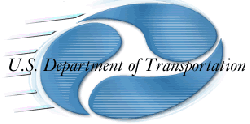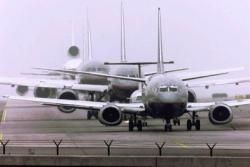Administration Calls On Airlines, Congress To Act In
Consumers' Interests
 ANN REALTIME UPDATE: 11.15.07 1700
EST: On Thursday, President Bush announced steps the
Administration is taking to help relieve air traffic congestion and
flight delays during the holiday season.
ANN REALTIME UPDATE: 11.15.07 1700
EST: On Thursday, President Bush announced steps the
Administration is taking to help relieve air traffic congestion and
flight delays during the holiday season.
After directing them in September to develop a strategy to
reduce aviation congestion, Bush met with Transportation Secretary
Mary Peters and Federal Aviation Administration (FAA) Acting
Administrator Bobby Sturgell to receive an update on their
progress.
The Administration Is Taking The Following Short-Term Steps To
Reduce Air-Travel Problems Over The Holidays
- The US military is going to make some of its airspace available
for use by civilian airliners this holiday season. Through an
agreement between the FAA and the Defense Department, the military
will open up new "Thanksgiving Express Lanes" in the sky during the
heaviest travel days to help reduce delays and congestion. This
newly available airspace will be available over water off the East
Coast and will help the most congested regions -- from Maine to
Florida -- for nearly five full days surrounding the holiday.
- The FAA is implementing measures to head off delays.
-
- FAA Acting Administrator Sturgell will impose a holiday
moratorium on maintenance projects that are not
time-sensitive -- so all FAA equipment and personnel can focus
on keeping flights on time.
- The FAA is partnering with the Port Authority of New York and
New Jersey to reduce bottlenecks in the New York metro area, which
is the source of most chronic delays. Nearly one-third of the
Nation's air traffic passes through the New York region, and
three-fourths of the chronic delays around the country can be
traced to delays in the New York area. This is a long-term project,
but several key items have been completed in time for the
Thanksgiving rush. For example, at both Newark and John F. Kennedy
Airports, planes can now use certain runways simultaneously without
compromising safety.
- The Department of Transportation (DOT) and the FAA are
encouraging airlines to take their own measures to prevent delays.
Airlines have already responded by agreeing to make more staff
available to expedite check-in and boarding; set aside extra seats
and even extra planes to help accommodate passengers affected by
cancellations and delays; and bring in additional ticket kiosks,
baggage handling gear, and rolling staircases.
New Proposed DOT Regulations Will Further Help Air Travelers
Confronted By Delays And Cancellations
 The President announced three new
proposed DOT regulations to help ensure air travelers are treated
fairly. The regulations will not be final for several months, but
the plan is for measures to be in effect by the summer travel
season in 2008. The proposals seek to:
The President announced three new
proposed DOT regulations to help ensure air travelers are treated
fairly. The regulations will not be final for several months, but
the plan is for measures to be in effect by the summer travel
season in 2008. The proposals seek to:
- Double the amount of compensation passengers receive when they
are forced off overbooked flights. For example, a passenger forced
to wait more than two hours for another flight would receive a
minimum of $800, instead of the current $400.
- Require airlines to collect and provide DOT with better data on
the sources of flight delays.
- Evaluate a number of other requirements for the airlines -
including mandatory contingency plans to aid stranded passengers
and penalties for chronically delayed flights.
The FAA is also going to better inform consumers by providing
real-time updates on whether flights at a particular airport are on
time or delayed, and by how much. This information will be
available at the FAA website, at the FMI link below.
Original Report
 On Thursday, President
George W. Bush will order a series of changes aimed at heading off
air traffic congestion for the upcoming US holiday travel
season.
On Thursday, President
George W. Bush will order a series of changes aimed at heading off
air traffic congestion for the upcoming US holiday travel
season.
The Associated Press reports the plan includes opening unused
military operations airspace (MOAs) for use by commercial flights;
insuring air traffic control facilities are well-staffed to handle
a glut of flights; and halting non-essential renovation and
construction work at FAA facilities, to reduce the chances of an
unforeseen electric failure or other construction-related
issues.
The White House also mandates the FAA to provide real-time
travel information, including up-to-the-minute reports on airport
delays -- on the agency's website. Ways to reroute airspace to fill
in "gaps" in the air and on the ground will also be considered.
Other measures are a bit broader. Under the Bush plan, the
Department of Transportation will propose increasing the amount of
money airlines must pay passengers who pay for a ticket, but wind
up without a seat on the plane. This so-called "bump fee" may be
increased threefold, to more than $600, according to the AP.
In another measure aimed at reducing "unfair and deceptive"
practices by airlines, the DOT would also slap heavy fines on
carriers operating flight deemed chronically late -- meaning it is
over 15 minutes late in arriving at its destination, more than 70
percent of the time.
Bush is to make the announcement flanked by DOT Secretary Mary
Peters, and Acting FAA Administrator Bobby Sturgell.
The proposal comes as the domestic airline industry's on-time
performance is the worst it's ever been, or at least since the DOT
began keeping track of delayed and cancelled flights in 1995. The
upcoming busy holiday travel season is expected to compound those
problems.
According to the Air Transport Association, domestic carriers
will likely fly roughly 27 million passengers worldwide over a
12-day period beginning Friday. Planes are expected to be about 90
percent full.
 Classic Aero-TV: Pure Aerial Precision - The Snowbirds at AirVenture 2016
Classic Aero-TV: Pure Aerial Precision - The Snowbirds at AirVenture 2016 NTSB Final Report: Costruzioni Aeronautiche Tecna P2012 Traveller
NTSB Final Report: Costruzioni Aeronautiche Tecna P2012 Traveller ANN's Daily Aero-Linx (11.23.25)
ANN's Daily Aero-Linx (11.23.25) ANN's Daily Aero-Term (11.23.25): Request Full Route Clearance
ANN's Daily Aero-Term (11.23.25): Request Full Route Clearance Aero-News: Quote of the Day (11.23.25)
Aero-News: Quote of the Day (11.23.25)





